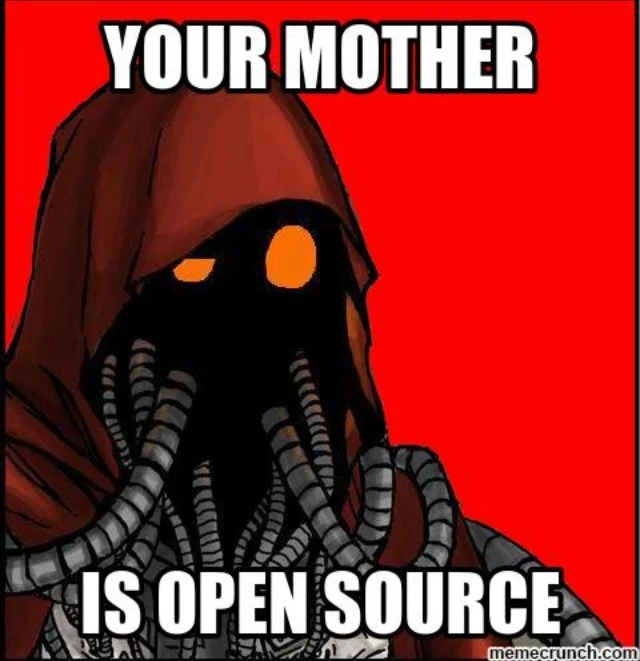Also why does everyone seem to hate on Ubuntu?
I think Arch is so popular because its considered a middle of the road distro. Even if not exactly true, Ubuntu is seen as more of a pre-packaged distro. Arch would be more al a carte with what you are actually running. I started with Slackware back in the day when everything was a lot more complicated to get setup, and there was even then this notation that ease of access and customization were separate and you can’t have both. Either the OS controls everything and its easy or you control everything and its hard. To some extent that’s always going to be true, but there’s no reason you can’t or shouldn’t try to strike a balance between the two. I think Arch fits nicely into that space.
I also wouldn’t use the term “cultists” as much as “aholes”. If you’ve ever been on the Arch forums you know what I’m talking about. There is a certain kind of dickish behavior that occurs there, but it somewhat is understandable. A lot of problems are vaguely posted (several times over) with no backing logs or info to determine anything. Just “Something just happened. Tell me how to fix it?”. And on top of that, those asking for help refuse to read the wiki or participate in the problem solving. They just want an online PC repair shop basically.
I don’t know about everyone else, but the last couple of years has had the most unstable Ubuntu releases, with the most unrecoverable releases when issues happen.
I’ve since moved to Fedora for desktop and straight Debian for server.
I’ve always found Ubuntu to be fairly brittle. I used it briefly after Mandrake but never liked it much.
I thought it was a fairly solid OS up until about 20.04, then it started getting wiggy.
I like Fedora. Can’t tell yoh why I rolled with it though.
I used it a little way back in 2005-2006ish, and decided to give it a try again after a third reinstall of ubuntu within a year last year.
though, I’m about to get a “new” laptop and may toy around with Arch on the old one. I had previously tried setting up Arch in a VM but that’s not supported and ended poorly.
My Ubuntu LTS installs have been rock solid.
Because the logo looks cool
For real. The new logo was the reason I switched back then. It was a tough experience, but worth it.
Arch Being cult like is stereotypical. Far from reality.
“oh no I took the memes literal”
This ain’t 2010 anymore. Community is great.
I left Ubuntu for Arch because I got sick of Arch having everything I wanted and Ubuntu taking ages to finally get it. I was tired of compiling shit all the time just to keep up to date.
Honestly glad I made the change, too. Arch has been so much better all around. Less bloat and far fewer problems.
The shortest answer -
Arch has really good documentation and a release style that works for a lot of people.
Ubuntu is coorporitized and less reliable Debian with features that many people dont need or want.
Can you elaborate a bit on don’t need or want software?
“Bloat” the less system there is (while still working as a modern system) the better. If i need something i can install it myself.
The biggest one: Snaps.
I switched from Ubuntu to Debian, and it’s basically the same thing, just faster since it uses native packages instead of Snaps. Ubuntu might as well run all it’s apps in Docker containers.
You could rebrand Debian to Ubuntu and most users wouldn’t even notice.
I agree, I switched from Ubuntu to MX Linux in 2016 or so, MX is based on Debian, always up to date, just works, Xfce, .deb, no snap, etc
like forcing snap or amazon search ads back in the day
Or mir, or pulseaudio before it was ready, or deprecating ffmpeg for half a year… Etc etc
In some release they removed gdebi package installer so it made unavailable to install deb files with gui
deprecating ffmpeg for half a year
wut
It’s true, and it was a huge pain in the ass:
Interesting read. It sounds like that issue came upstream from Debian not Ubuntu though.
At the time, canonical was throwing its weight around and essentially bullying Debian upstream repos. Around this time, there was a mass exodus of the Debian leadership over this kind of thing.
The old guard of Debian wasn’t as… enthusiastic about systemd either, but look what they use now.
They pushed systemd really early too, right?
They pushed their own init system, Upstart, before jumping onto the systems bandwagon.
I think so. I lost count of the little things, it really was death by a thousand paper cuts.
I was a pretty rabid fan of Ubuntu, still have an x86 and ppc CD of 5.04 somewhere.
But by the time snaps started appearing, and then Ubuntu pro, Ubuntu decided to revert some of my customized configs in /etc after an upgrade, I had had enough. When snaps were reinstalled after an upgrade in 2021, I just flipped over to Debian, which has come a long way in being usable out of the box.
These days it’s mainly snap and how you can type apt install and the system will do snap install instead, for firefox for example.
Firefox has instructions on their website for adding their PPA and pinning it over Ubuntu’s. I find it interesting that they made an official response that seems to say “yeah nonconsensual snaps are bad, here’s another option”
I like arch because:
- it is rolling release and I like having up to date software and not having to deal with distro upgrades breaking things
- it is community run and not beholden to a company
- packages are mostly unmodified from their upstream
- the wiki and forums are the best of any distro
:: Searching AUR for notes... -> Missing AUR Packages: SideNote there is nothing to readthe wiki
and forumsare the best of any distroIf you don’t participate in it that is.
If you veer only a little off of their strict rules,
then Arch forum will ban you and they won’t allow you to even read the forum.
I just think it’s neat.

I’m quite experienced in Linux but I wouldn’t use either. Arch is great if you like to tinker, Ubuntu sucks for the not so libre approach , corporate ties, telemetry etc. I distrohopped before but today I just install my debian based distro and shit works… Ubuntu I’ve installed twice before when I was new to Linux, and have had a major issues every time due to official updates that broke internet drivers and other things, that’s a fun one when you only have one PC . Not to mention its so bloated that shitty computers that I like to thinker with it have a hard time catching up. The arch thing is also mostly a kind of meme, targeting the more unbearable nerds. People I hated when I was a noob (they will let you know you are) But they are found everywhere and in general I don’t think there’s more of those people in arch community than anywhere else. It’s more of a stab at elitism than arch specifically.
I see a point in arch but zero in ubuntu.
vocal peope on social media ≠ everyone
I don’t really have a concise answer, but allow me to ramble from personal experience for a bit:
I’m a sysadmin that was VERY heavily invested in the Microsoft ecosystem. It was all I worked with professionally and really all I had ever used personally as well. I grew up with Windows 3.1 and just kept on from there, although I did mess with Linux from time to time.
Microsoft continues to enshittify Windows in many well-documented ways. From small things like not letting you customize the Start menu and task bar, to things like microstuttering from all the data it’s trying to load over the web, to the ads it keeps trying to shove into various corners. A million little splinters that add up over time. Still, I considered myself a power user, someone able to make registry tweaks and PowerShell scripts to suit my needs.
Arch isn’t particularly difficult for anyone who is comfortable with OSes and has excellent documentation. After installation it is extremely minimal, coming with a relatively bare set of applications to keep it functioning. Using the documentation to make small decisions for yourself like which photo viewer or paint app to install feels empowering. Having all those splinters from Windows disappear at once and be replaced with a system that feels both personal and trustworthy does, in a weird way, kind of border on an almost religious experience. You can laugh, but these are the tools that a lot of us live our daily lives on, for both work and play. Removing a bloated corporation from that chain of trust does feel liberating.
As to why particularly Arch? I think it’s just that level of control. I admit it’s not for everyone, but again, if you’re at least somewhat technically inclined, I absolutely believe it can be a great first distro, especially for learning. Ubuntu has made some bad decisions recently, but even before that, I always found myself tinkering with every install until it became some sort of Franken-Debian monster. And I like pacman way better than apt, fight me, nerds.
Arch has a cult like following because it emphasizes simplicity and customizability. If you have the time to fully administer your own system, there is no better choice.
Ubuntu is corporate, frequently out of date, and sometimes incompetent. They got big a long time ago when they were a significantly easier option than their competitors, but I really don’t think there’s compelling reason for a new user to install Ubuntu today.
To add to the arch management, after a while you learn the golden rule - set it and don’t fiddle with it too much. Nowadays there is very little maintenance to it. I run an update followed by shutdown. Once every 2-3 months there is some issue, that takes a forum search to fix and once a year it breaks to the level where I need about half an hour to an hour to fix it.
Normal people who use Arch don’t bring it up much, because they’re all sick of the memes and are really, REALLY tired of immediately being called rude elitist neckbeard cultists every time they mention it.
The Ubuntu hate is because Canonical has a long history of making weird, controversial decisions that split the Linux community for no good reason.
What decisions for example?
Amazon, Mir, Unity, Snap etc.
Unity would be the first example, and although Unity was actually a good DE,
it was too bloated and almost non-modifiable.People jumped ship to Linux Mint that had its priorities straight.
Mir and Snap were bigger issues though
as Wayland and Flatpak were great replacements for
X11 and AppImage and did not need another competitor.But the privacy issues were the straw that broke the camel’s back.
People left windows for linux so they wouldn’t have to deal with this kind of nonsense.I actually jumped when Ubuntu jumped to Gnome 3.
Gnome 3 was too bloated for me and it looked ugly.I decided to see what Arch Linux was about
and eventually settled for Manjaro Linux.
Arch + Xfce for the win.I left Ubuntu after Unity, it could have been the greatest thing ever, but Canonical deciding what was best for me felt too much like Microsoft just shoving whatever garbage they wanted to my system.
I tried Ubuntu on a laptop, and when i saw the Amazon logo, I did a double take. I actually got a bit dizzy, and had to evaluate what I had just done.
Shame on me though, because I installed Ubuntu on a vps, and got spam in my ssh session. “Get Ubuntu pro now!”
Sigh.
We’re not a cult. Come on out to our compound and we’ll show you!
Yep, this is it…

Arch is amazing for what it is, hence the love. It’s what you make of it; by default there’s nothing and you design your own system from scratch. This leads to a very passionate and enthusiastic community who do great work for one another, for everybody’s benefit. Anything under the sun can be found in the AUR, the distro repos are fresh and reliable, and every issue that arises has a hundred people documenting the fix before it’s patched.
Ubuntu has a bad reputation for inconsistency, privacy invasive choices, etc. I don’t think all the hate is deserved, as they corrected course after the Amazon search fiasco, but I still won’t use it because of Snaps. They have a proprietary backend, so even if I wanted to put up with their other strange design decisions I can’t unless I wanted closed source repos. That goes against my whole philosophy and reasoning for being on Linux to begin with, and many feel the same.














